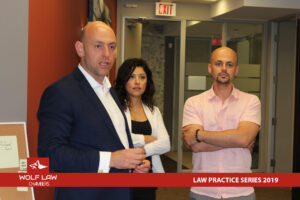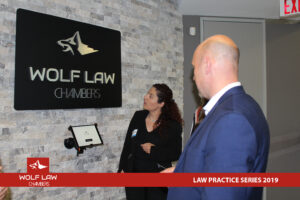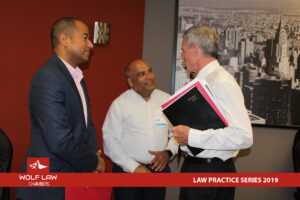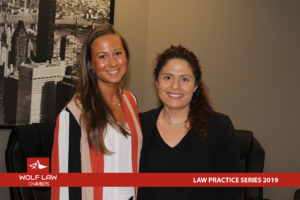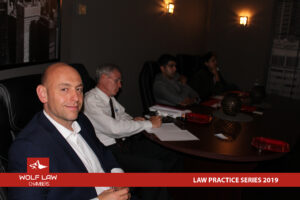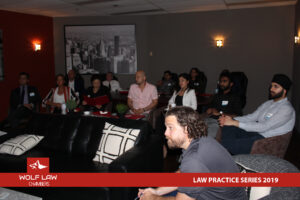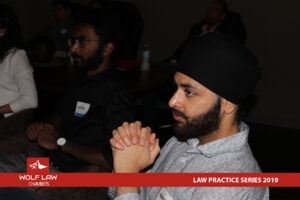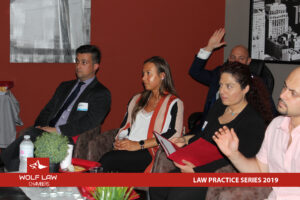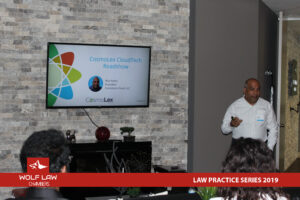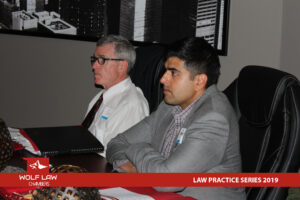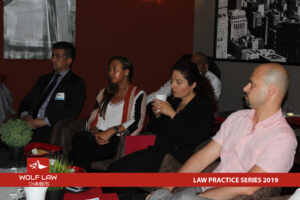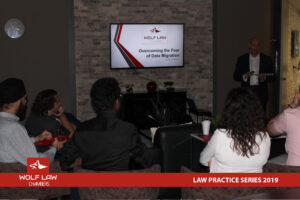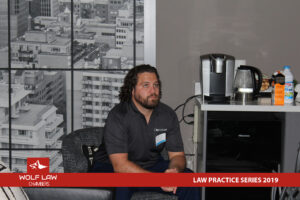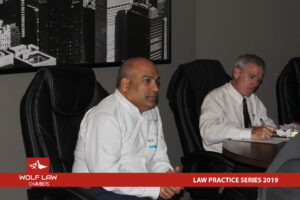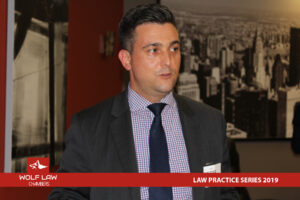Archive for July 2019
5 ways to effectively market yourself in a legal practice
In today’s market, competition is generally high. How we present ourselves to the world can make a significant impact on the success of our firm or practice. So here are the 5 ways to effectively market yourself in the legal market.
We made sure to keep our list simple and easy to remember:

These are the traditional five senses. It should be the goal of the effective legal firm or practice to reach all five senses of potential clients through various means.
 Vision:
Vision:
It is important for the practitioner, or any business for that matter, to reach the potential client’s line of sight. There are many ways to do this. In today’s market, however, one of the most effective means for catching the eyes of the potential client is by having a clear and simple website which is easy to use and, most importantly, is on the first page of a Google Search. Also, if it is known that a specific group of potential clients watch a particular channel on TV, try to put an advertisement on that channel. If your potential clients are likely to spend more time on YouTube, make a YouTube channel or advertisement.
But don’t just stop after that. A marketing campaign is not just outside the office but inside as well. If a potential client walks into the office, it is important that such office looks good (check out our article on the Perfect Office). Furthermore, it is important that the practitioner looks good! So make sure to dress to impress.

Reaching the client’s line of sight and gaining their attention and interest is very important, for our memory works best from visual stimuli. In other words, we are generally better at remembering or recalling what we have seen attentively rather than what we smell or touch. So make sure to reach the eyes of potential clients and show them your value.
 Hearing:
Hearing:
Human beings are generally good at remembering what they have heard if they are attentive to what they hear. So it is important for any practitioner or firm to be heard in a way that draws attention.
There are many ways to be heard. Today, podcasts are quite popular. It may be beneficial to attend someone’s podcast and speak with clarity and specificity. Another option is to place an advertisement on a radio channel if it is known that potential clients will be listening to that channel.

However, the best and most effective way to be heard is to be a good lawyer or firm. If the work you do is exceptional, it is possible that clients will speak on your behalf by placing a good review. Reputation matters a lot in this field. There is nothing better than a potential client saying, “I hear this lawyer is amazing at what he does.”
 Smell:
Smell:
In contrast, there is nothing worse than a potential client saying, “something smells fishy.” Trust is crucial to a legal practice not only from a legal standpoint but also from a business standpoint. In addition to the metaphorical sense of smell, it may also help to literally smell good.
Olfactory marketing is a relatively underdeveloped field of sensory marketing. However, there is evidence that the scent of a person may have an impact on first impressions. And if first impressions are good, then the following impressions tend to also be good. Thus, to enhance the likelihood of good impressions, make a good first impression by investing in scents which make the office smell good and make the lawyer smell good.
 Taste:
Taste:
Did someone say, “free pizza?”. It is common knowledge that our actions sometimes follow our stomachs. So to be more welcoming to potential clients or current clients, make sure to invest in some refreshments for clients entering the office. Offer them coffee or tea during meetings, give them refreshments, etc. Be hospitable. Sometimes, it could even help to take a potential client to lunch.
 Touch:
Touch:
Be careful with this channel of marketing. There are some clients who are huggers and some who are not. But nothing beats a strong and confident handshake. Since first impressions matter, and a handshake significantly affects first impressions, handshakes do matter.

But handshakes are not only important for first impressions. It can also be important when saying goodbye. Last impressions can sometimes be just as important as the first. So make sure, after speaking to a potential client, to give a good handshake when saying goodbye for the day.
Sensory Marketing (Scrap Notes)
|
(what do customers see?) |
|
|
|
|
|
|
|
|
|
|
|
|
|
When Consent Fails to Waive Conflict
A few weeks ago, we at Wolf Law Chambers published an article on how legal practitioners can navigate the law to fulfill their duty to avoid conflicts of interest. We finished the article subtly hinting at the idea that the removal of a lawyer due to conflict of interest may be waived where the affected parties consent to their representation. In other words, we suggested that a lawyer may act or continue to act in conflict of interest when they are given consent from all affected clients.
Today, let’s expand on this matter, for it deserves its own article. The legal nature of consent, in this context as well as other contexts, is complicated and can be quite difficult to navigate. The risk of misinterpreting the law could be disastrous. Clients generally don’t want to lose their lawyers while lawyers generally don’t want to lose their clients, especially in the middle of a serious legal battle. So to help lawyers and clients in avoiding such disastrous scenarios due to the misinterpretation of consent, this article will outline the scope of consent and when it does not waive conflicts.
Conflict of Interest
In the previous article, we established that there are four types of conflicting interests: (1) personal interest conflict; (2) current client conflict; (3) former client interest conflict; and (4) conflicts arising from third persons. The first type pertains to the conflict between the client’s interest and the lawyer. The remaining types consist of a conflict between a client’s interests and their lawyer’s legal duty to others. When such conflict occurs, the lawyer shall not represent their client.
Consent
According to the Complete Rules of Professional Conduct,
A lawyer shall not represent a client in a matter when there is a conflict of interest unless there is consent, which must be fully informed and voluntary after disclosure, from all affected clients and the lawyer reasonably believes that he or she is able to represent each client without having a material adverse effect upon the representation of or loyalty to the other client.
Hence, if a lawyer can ever represent a client while in conflict of interest, there must be consent. And this consent cannot simply mean, “I consent” or “I’ll allow my lawyer to represent me.” The consent must be fully informed and voluntary and after full disclosure. Thus, it is not only what the client says but how they say it that matters before the law. If the consent is not (1) fully informed, (2) voluntary, or (3) given after the lawyer’s disclosure, then the rule indicates that such lawyer shall not represent said client when there is a conflict of interest.
It is important for all lawyers to disclose situations of conflicts to their affected clients when it arises. According to the commentary under rule 3-4.2 of the Complete Rules of Professional Conduct, “Disclosure is an essential requirement to obtaining a client’s consent and arises from the duty of candour owed to the client. Where it is not possible to provide the client with adequate disclosure because of the confidentiality of the information of another client, the lawyer must decline to act.”
Valid and Binding Consent
If the consent received is not valid or binding, it will not be held as a strong reason to waive a conflict of interest. Courts will consider the validity of the consent with great scrutiny, as exhibited in Chiefs of Ontario v Ontario, [2003] OJ No 580 [Chiefs of Ontario]. This was a story of a law firm and Mnjikaning First Nation (MFN). What started as a strong business relationship became palpably hostile, whereby members of the firm even referred to MFN as a “wolf in sheep’s clothing.” In response to a suit submitted by the firm against MFN, the First Nation group sought to remove the members of the firm as opposing counsel, since the firm had once represented them for previous legal matters.
In this case, the Court questioned whether the past consent provided by MFN to the firm was valid and binding in waiving the firm’s conflict of interest. When approaching this issue, the Court addressed three main questions to determine valid and binding consent:
- Whether the client received independent legal advice;
- Whether there was full disclosure by the lawyer; and
- Whether the lawyer fulfilled their duties when obtaining consent.
Upon carefully answering each question, the Court concluded that consent was valid and binding. The client received independent legal advice, received full disclosure by the lawyer when participating in negotiations, and the firm fulfilled its duties to ensure consent was informed through the independent legal advisor.
Specific Consent
Some readers may wonder what the outcome of the case was. After all, consent was valid and binding. The lawyer obtained fully informed and voluntary consent after disclosure. So the firm may continue to act against their former client, MFN, right? Interestingly, that was not the case. After establishing that the consent given by MFN to the firm on acting during conflict was valid and binding, the Court went on to question whether their consent was specific enough to include the matter of this particular case. In other words, the Court had to determine whether the scope of MFN’s consent covered the circumstances of the matter at hand.
This line of questioning makes sense upon consideration. If consent is given to someone, isn’t it important to know what the consent was for? Was the consent for all conflict, some conflict? Was it for current conflict or future conflict? These questions can play a major role in the outcome of a case, as it did in Chiefs of Ontario. In this case, the Court listed the factors that must be considered to determine the scope of consent:
- The quality and degree of adversity between the lawyer and the affected client;
- The quality and degree of potential adversity contemplated by the lawyer and affected client;
- The nature of the retainer through the retainer and at the time of consent; and
- The nature of the information to which the lawyer had access.
After considering each factor, the Court found that the matter was outside the scope of the consent.
There’s More?
Now, we have established a general understanding of consent. Let’s recap. In order to waive a conflict of interest, there must be the valid and binding consent, which requires fully informed and voluntary consent after full disclosure and independent legal advice, and there must be consent that is specific enough to the matter at hand. Suppose these criteria are filled. Can we infer that the lawyer may act or continue to act in conflict of interest? It appears we cannot.
Truly, there must be consent. But that doesn’t mean conflict will be waived, though it can be waived. In the case of Law Society of Upper Canada v Carlesso [Carlesso], the facts were of a lawyer who once represented a woman with whom he became romantically involved with and with whom he became engaged. Though we are happy for the couple, it is established law that a lawyer shall not act in a manner which conflicts with the interests of their client when it adversely impacts their judgment on behalf of their client. Indeed, “proving proper consent will be very difficult where a lawyer has a sexual relationship with a vulnerable client, absent independent legal advice.”
But the lack of consent is not the reason we share this case in this article. The reason we share this case is because, near the beginning of the decision, the Law Society Tribunal explains that lawyers may not act for a client even in times when there is proper consent, as they state:
While conflicts can sometimes be waived by a client, waiver must be informed and voluntary. In the circumstances of this case, there was an ineffective waiver of a conflict that was properly identified. What was not recognized was that what started as a risk of impaired client representation evolved into actual impairment of representation. Even with proper consent, a lawyer may not act or continue to act where a conflicting interest actually impairs client representation. To be clear, while clients can “waive conflicts” in proper circumstances, client consent does not permit a lawyer to act without fidelity to law. A client is not entitled to authorize a lawyer to act unlawfully.
So in other words, when the conflict results in impairment to the representation of the client by the lawyer, consent will not waive the conflict. It is more important that a lawyer acts with proper judgment than to receive consent for conflict. It is unlawful to act for a client when judgment is impaired. That is the boundary of consent.
Beyond the Line
There are a few scenarios in which this boundary has been breached. In the case of Alberto Union of Provincial Employees v United Nurses of Alberta Local 168 [United Nurses], the Court stated,
There are some situations where consent is simply ineffective, notwithstanding the good faith and intentions of the lawyer and the clients. There will be situations where matters unfold in such a way that the lawyer simply cannot continue to act, regardless of the consent obtained. Those situations may arise from the fiduciary duties of lawyers as set out in Neil, or from the passage of confidential information described in MacDonald Estate
So let’s dive into these two cases (Niel and MacDonald Estate) below.
Passage of Confidential Information
The Supreme Court in MacDonald Estate v Martin [MacDonald Estate] was faced with an issue concerning the “standard to be applied in the legal profession in determining what constitutes a disqualifying conflict of interest.” The respondent, who was the plaintiff in an action against the appellant, had once retained A. Kerr Twaddle, who was assisted by a graduate articling student. The student was actively engaged in the case on behalf of the appellant. Years
later, the student began practicing law at the Thompson firm. This firm represented the respondent in this case. The question, then, was whether Thompson and some associates are disqualified from continuing to act in this litigation by reason of conflict of interest. In order to determine this, Court derived a test, which essentially asks two questions:
- Did the lawyer receive confidential information attributable to a solicitor and client relationship relevant to the matter at hand?
- Is there a risk that it will be used to the prejudice of the client?
The Court found that the lawyer received confidential information and inferred that relevant information was disclosed. On that basis, the appeal was allowed and the trial judge’s decision to grant the order requested to remove the lawyer by reason of conflict of interest.
The application of the test in MacDonald Estate can also be found in cases like Gloger v Evans [Gloger], where the Ontario Superior Court of Justice dismissed the plaintiff’s motion to remove a law firm on the grounds of conflict of interest. In the Court’s view, since the firm did not receive confidential information, and all of the information provided was irrelevant to the issue at hand, the plaintiff failed to meet the first part of the test; and thus, the Court did not order the removal of the firm by reason of conflict.
It’s important to keep in mind that these decisions were made notwithstanding consent. The Supreme Court restored the judgment to remove a firm by applying the test for disqualifying conflict; and the Superior Court decided not remove a firm by applying this test. As the Court in United Nurses mentioned, the MacDonald Estate case was decided regardless of the presence of consent. And the same goes for Gloger.
Fiduciary Duties
Another example of a time where consent is ineffective in waiving conflict is where there is a breach of fiduciary duty. In the case of R v Neil [Neil], two out of five indictments were of concern. The appellant was charged with fabricating court documents and was charged with scheming to defraud Canada Trust. The conflict of interest largely concerns Gregory Lazin, who was a member of the Venkatrman firm. With regards to the Canada Trust indictment, the firm acted for the appellant while representing a Helen Lambert, who had adverse interests to the appellant on a separate civil issue. Lazin arrived for about 12 minute in Helen’s meeting at the firm to gather information that paints the appellant as the manipulative criminal and Helen as an innocent dupe. This is against the appellant’s interest. And with regards to another indictment, called the Doblonko indictment, Lazin had used a client, Doblonko, to boost the credibility of his defence on Helen’s case in the Canada Trust matter.
The issue at hand was on the limitations of the lawyer’s duty of loyalty where the lawyer did not receive confidential information; and whether the firm or Lazin breached their duty. Several helpful cases were cited to derive a conclusion. The court cited Ramrakha v Zinner, (1994), 157 AT 279, where it stated,
A solicitor is in a fiduciary relationship to his client and must avoid situations where he has, or potentially may, develop a conflict of interest… The logic behind this is cogent in that a solicitor must be able to provide his client with complete and undivided loyalty, dedication, full disclosure, and good faith, all of which may be jeopardized if more than one interest is represented.
The Court also cited Davey v Woolley, Hames, Dale & Dingwall, (1982) 35 OR (2d) 599, which stated:
The underlying premise… is that, human nature being what it is, the solicitor cannot give his exclusive, undivided attention to the interests of his client if he is torn between his client’s interests and his own or his client’s interests and those of another client to whom he owes the self-same duty of loyalty, dedication and good faith.
In the Neil case, the Court confirmed that the firm and Lazin had put themselves in a position of conflict where duties to other clients conflicted with the duty of loyalty to the appellant. They attempted to act for both the appellant and Helen, who clearly had an adverse interest; and the firm breached its duty to the appellant by accepting a retainer that required them to submit, before a court, evidence of illegal conduct of the appellant. This was unacceptable, notwithstanding any concern for consent.
Concluding Remarks
As best stated by the Law Society Tribunal,
Lawyers are required to act in the interests of their clients within the bounds of the law. This is sometimes described as zealous representation in fidelity to law. Lawyers easily appreciate the duty of zealous representation owed to their clients but some seem to less easily appreciate the duty of fidelity to law.
So before embarking on the difficult path through conflicting interests, both lawyers and clients must be careful with consent. It is not a tool to waive all conflicts. It is a means to allow lawyers to represent their clients insofar as such represent does not impair the judgment
of the lawyer and insofar as they do not breach their fundamental duties as lawyers. It is the duty of the lawyer to balance their zealous representation of a client and their fidelity to law.
By Aaron Rajesh and Dezso Farkas
1- Law Society of Ontario, Complete Rules of Professional Conduct, at rule 3.4-1. https://lso.ca/about-lso/legislation-rules/rules-of-professional-conduct/chapter-3#ch3_sec4-1-duty-to-avoid-conflicts 2-Ibid at rule 3.4-2. 3-Chiefs of Ontario v Ontario, 63 OR (3d) 335, [2003] OJ No 580, at para 2. 4-Ibid at para 53. 5-Ibid at paras 25-44. 6-Ibid at para 51. 7-Ibid at para 7. 8-Law Society of Upper Canada v Carlesso, [2014] LSDD No 122, 2014 ONLSTH 129 [Carlesso]. 9-Ibid at para 11. 10-Ibid at para 32. 11-Alberta Union of Provincial Employees v United Nurses of Alberta, Local 168, [2009] AJ No 48, 2009 ABCA 33, 94 Admin LR (4th) 169, 307 DLR (4th) 44, [2009] 6 WWR 235, 1 Alta LR (5th) 217, 2009 CarswellAlta 51, 448 AR 101, [2009] CLLC para 220-030, 164 CLRBR (2d) 105. [United Nurses] 12-Ibid at para 30. 13-MacDonald Estate v Martin, [1990] 3 SCR 1235, [1990] 3 RCS 1235, [1990] SCJ No 41, [1990] ACS no 41, 1990 CanLii 32. 14-Ibid at para 1. 15-Gloger v Evans, 2018 ONSC 4919. 16-R v Neil, [2002] 3 SCR 631, 2002 SCC 70, [2002] 3 RCS 631, [2002] SCJ No 72, [2002] ACS no 72. 17-Ibid at para 25 18-Ibid at para 26. 19-Ibid at para 31. 20-Ibid at paras 32-33. 21-United Nurses, supra note 11, at para 30. 22- Carlesso, supa note 8, at para 1.
THE BENEFITS OF BEING A SOLE PRACTITIONER
In 2013, 77% of Ontario’s law firms were comprised of sole practitioners and the number of new lawyers choosing that route is still consistently increasing. This figure is no coincidence as becoming a sole practitioner definitely encompasses countless benefits to one’s career. Choosing your line of work and narrowing that further into a specialization is truly fulfilling for any professional. Lawyers who practice as sole practitioners are able to effectively explore various practices without seeking permission or approval from others. This flexibility also corroborates opportunities for expansion and innovation. It paves the way for lawyers to constantly keep an eye out for procedures that need improvement and implement new ideas that look to accomplish exactly that. This can make a sole practitioner’s work interesting and engaging, shifting focus away from the pressures that inevitably exist in the profession. In doing so, the results produced by sole practitioners preserve the highest standards for their clientele and practice. It is these results that ensure one’s business is continually growing. Now, let’s explore the top and most important benefits of being a sole practitioner.
Flexible Work Schedules
The 17th Volume of the Robert Half: Demand for Skilled Talent report outlined incentives that workers want the most. On the top of that list was flexibility for work hours, with 88% of employees surveyed citing it as the perk that they most desire. This figure is also indicative of a lack thereof in the respective fields of the participants in the study. For sole practitioners flexibility is apparent as professionals work around their own schedules and allocate work hours based on priorities. The ability to prioritize one’s workload is also extremely beneficial as sole practitioners are able to dedicate time to other fundamental areas of their practice. Such practices include but are definitely not limited to marketing, workshops/conferences to further advance one’s knowledge and skill set, networking events, and/or educational certifications. Doing so requires time and effort, which can be difficult to allocate unless you are dictating your own schedule.
![14 [Converted]-01](https://www.wolflawchambers.ca/wp-content/uploads/2019/07/14-Converted-01-300x300.jpg)
Return on Investment
Sole practitioners work for themselves and reap all the benefits of their efforts. The harder they work, the more rewarding it is. Their salary is not administered under someone’s payroll, so the net gain of a sole practitioner depends on their ability to attract clientele and manage their legal needs effectively. Sole practitioners do not have to manage an immense workload and worry about their residuals staying the same. The more time and effort they invest into their practice, the greater the yield of results.

Opportunities to Experiment
Whether it is implementing new technology, diversifying your line of work, or integrating new ideas for enhancing productivity, sole practitioners can choose to experiment without seeking permission from a higher authority. In the legal field, technology is changing the way traditional law firms have worked. For example, Dezso Farkas, of Farkas Legal Professional Corporation based out of Mississauga has been cited implementing innovative technology to emphasize the importance of efficiency as a sole practitioner. Using technological applications such as Skedda, Slack, and Envoy enable his firms daily practices to run very smoothly. These communication applications allow clients, the lawyer, and staff to engage in ways that are very advanced. Individuals can complete tasks for each other and receive communicate throughout the day without being in the same vicinity. Deanna Hayko, a partner at iN STUDIO in Toronto believes that office spaces more open to the idea of a neighborhood environment are able to allow for increased mentorship and inclusiveness.
A prime example of this environment is a chambers located in the heart of Mississauga. Known as Wolf Law Chambers, this office has become a community of lawyers working independently as sole practitioners. This is a new approach to the traditional firm and allows for inclusivity between lawyers on different matters that may intersect different areas of practice. Lawyers at this chambers are also able to interact and become part of a community of professionals. This stimulates growth and provides sole practitioners with an opportunity to share resources to resolve legal matters.
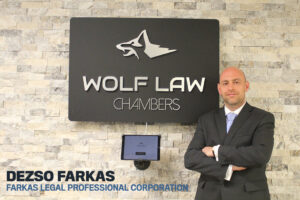
Service
Clients are more informed than ever with the help of the Internet, so it is important for lawyers to dive into niche markets to better serve their clients. By becoming a sole practitioner, lawyers can figure out their passions and dedicate their services accordingly. This flexibility allows lawyers to serve their clients better and in turn, ensure client satisfaction. By being able to devote more time an effort to individual clients, the client always remains the priority for a sole practitioner. Sole practitioners are able to concentrate on each individual matter effectively without the concern of being bombarded with work they do not want to complete, paving the way for excellent client and lawyer relations.
Closing Thoughts
In summary, being a sole practitioner presents a vast amount of benefits for lawyers looking to operate with flexibility, gain high returns on their investments, have complete control of their work, experiment with new ideas to improve their practice, and serve their client base with the utmost sincerity. Sole practitioners are in complete control of everything that follows along with their practice and they are in charge of what they want to do in each and every matter they pursue. They are able to choose their line of work by investigating and streamlining their passions in law. Also, sole practitioners can constantly brainstorm new strategies that will improve their practice and ensure clients remain extremely satisfied with the exceptional service they are able to receive. With that being said, if you are a lawyer or plan on becoming one, I urge you to give becoming a sole practitioner a great deal of thought.
-Narvir Goindi

Wine & Cheese with CosmoLex
On Wednesday, July 10, 2019, Wolf Law Chambers hosted a Wine & Cheese event at 6 p.m. in its main location at 90 Matheson Blvd W, Suite 101. Without doubt, I can say the event was big success. It was a wonderful turnout, as the boardroom was filled with great people from various backgrounds in law and, surprisingly, other fields of practice (shout out to the chiropractor).
Together, we learned about the importance of practice management products for professions required to manage their accounts, matters, calendars, etc. But more specifically, we discussed the methods for migrating data from one system to another. This was the crux of the matter. Suppose a lawyer has 30 years of experience, but no experience with practice management software. Suppose they thought, “hey, CosmoLex seems great”. How would they migrate the 30 years of data which was once recorded, on paper, and nothing is online?
This is a difficult question. But fortunately, lawyers don’t have to answer this question of how. It is best left to the professionals of data migration. The question more relevant to the lawyer is when to migrate their data. This is where CosmoLex helped our discussions quite effectively and clearly. They have a data migration department, comprised of people who devote their time solely to the migration of data to one practice management system to a practice management software system. The lawyer mainly has to let the team know the appropriate times for migrating their data.
Rick from CosmoLex was succinct in speech and honest in his approach to the main questions facing legal practitioners seeking a management software that works for the practitioner. He emphasized the nature of the software as that of a co-worker who helps administrate a legal practice. This was a particularly interesting analogy that reshaped the way I think about practice management software. Perhaps it might reshape the thoughts of others as well.
Overall, the event was great, the people were great, and the presentation by Rick from CosmoLex was great. Thus, the members of Wolf Law Chambers duly thank those who came to event and made the night great. A great sense of community was felt throughout.
“I had an opportunity to showcase CosmoLex as part of our CloudTech Roadshow at Wolf Law Chambers. I am thoroughly impressed with the facilities of Wolf Law Chambers and more importantly their focus on providing continuous learning and networking opportunities to their members as well as for area law firms. Keep up the great work Dez!” said Rick Kabra, President CosmoLex.
“It was fantastic to see the level of interest in what we are doing here at Wolf Law Chambers”, said Dezso Farkas of Wolf Law Chambers.
“So many lawyers and paralegals practicing on their own would like to be part of a community where they can share ideas and collaborate with other professionals.”
Wolf Law Chambers is a multidisciplinary law practice, providing professional legal services to clients in several areas of law, including corporate, commercial, family, immigration, criminal, and real estate. The ability for a lawyer to run their practice and be accessible to clients, while having the freedom and flexibility to make use of a larger firm’s resources is powerful. The encouragement and freedom to consult legal ideas with other lawyers within the same field or across different fields, leads to better and stronger representation of client interests.
Conveniently located near Hurontario and Hwy. 401 in Mississauga’s business cluster, our premier location is minutes away from the Superior Court of Justice, Small Claims Court, Provincial Offences Court, and Downtown Mississauga Square One area.
We recommend anyone to come visit us. Wolf Law Chambers will be happy to connect with you.






